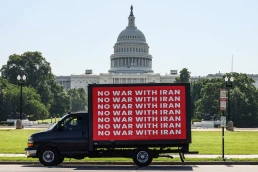From the global War on Terror to Donald Trump’s second term, a legacy of legal abuses.
By Karen J. Greenberg, Tom Dispatch
Post-election America finds itself in a panic. Voices from across a wide political spectrum warn that the country stands on the precipice of a potentially unprecedented and chaotic disregard for the laws, norms, and policies upon which its stability and security have traditionally relied. Some fear that the “new” president, Donald Trump, is likely to declare a national emergency and invoke the Insurrection Act, unleashing the U.S. military for mass deportations of undocumented immigrants and for “retribution against” the “enemy from within” as well as “radical left lunatics.” As the New Republic‘s editor Michael Tomasky notes, writing about the nomination of Kash Patel for the post of director of the FBI, “We’re entering a world where the rule of law is turned inside out.”
The blame game for such doomsday fears ranges far and wide. Many pinpoint the Supreme Court’s 2023 decision to grant immunity to presidents for their core official acts, essentially removing any restraints on Trump’s agenda of retribution and revenge. Some, like Democratic Senators Elizabeth Warren and Richard Blumenthal, see loopholes in the law as the basis for their concern about the future and are urging Congress to pass legislation that will place additional constraints on the deployment of the military on American soil. Others argue that the Constitution itself is the problem. In his new book, No Democracy Lasts Forever: How the Constitution Threatens the United States, Berkeley Law School Dean Erwin Chemerinsky even suggests that it may be time for a new constitution.

But those involved in the fear and blame game might do well to take a step back and reflect for a moment on how we got here. Today’s crisis has been evolving for so many years now. In fact, much (though admittedly, not all) of what we’re witnessing today might simply be considered an escalation of the dire turn that this country took after the attacks of September 11, 2001, nearly a quarter of a century ago.
It was January 2002 when White House Counsel Alberto Gonzales used the two words “quaint and obsolete,” whose echoes remain eerily with us to this very day (and seemingly beyond). The occasion was a debate taking place at the highest levels of the administration of President George W. Bush in the aftermath of the 9/11 attacks. By then, this country had invaded Afghanistan and authorized the opening of a new detention center at Guantánamo Bay, Cuba, ominously offshore of American justice, for captives of what already was being called the Global War on Terror. Two weeks after the first prisoners arrived at that prison camp on January 11th, administration officials were already wondering which, if any, laws should apply when it came to the treatment of such prisoners.
Gonzales, who was to become the attorney general in Bush’s second term, laid out the options for the president. At issue was whether the Geneva Conventions — a set of treaties established in the wake of the atrocities of the Second World War — applied to the United States in its treatment of any prisoners from its war on terror.
Recent Posts
A War With Iran Would Not Be a One-Off Event But a Disastrous Ongoing Rupture
February 26, 2026
Take Action Now If Congress cedes its power to stop a war with Iran, it will fully erode any lingering promise of democratic restraint.By Hanieh…
New Addition to List of Nuclear Near Catastrophes
February 25, 2026
Take Action Now Debris flew for great distances — many times the distance of 270 meters to a nuclear reactor and nuclear storage facility.By David…
Gavin Newsom’s last budget belies his ‘California for All’ pledge
February 24, 2026
Take Action Now Yet, even as the state is poised to lose billions in federal funding, and millions of Californians are losing access to health care…
Israel and American Hawks are Pushing U.S. to Iran War With Catastrophic Consequences
February 23, 2026
Take Action Now At the World Health Assembly in May, member states may endorse an unprecedented strategy declaring that health is not a cost – but…




